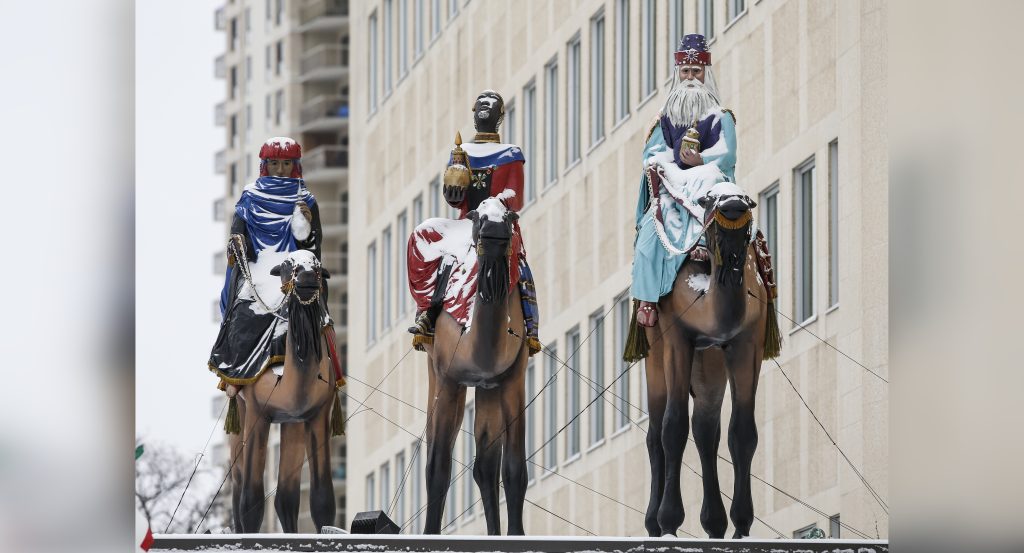‘Iconic Winnipeg Christmas tradition’: A look at Canada life’s three wise men statues

A sign of the jolliest time of year is once again making its appearance near downtown Winnipeg, signalling the start of the hustle and bustle of the holiday season.
For more than 50 years, statues of the Three Wise Men riding camels are hoisted on top of the Canada Life building on Osborne Street.
The long-standing holiday tradition started in 1973 when the company, formerly known as Great-West Life Assurance Co., first displayed the more than four-metre-tall statues.
Advertisement
Brenda Uzelmann remembers her family driving past on their way to church when she was a child, once glimpsing crews assembling the camels and three men.
“They’re beautiful statues. The family that I was raised in, that was Christmas for us, was this celebration of the birth of Christ,” said Uzelmann. “It was big for our family.”
In the years since, Uzelmann has left Winnipeg and come back and says nothing compares to the grandness of those statues.
“It’s an iconic Winnipeg Christmas tradition,” she said.
Each year, a crane hoists the camels and their riders into place, often in the dead of night. The 135-kilogram statues are secured with sandbags and wires, which can take several hours and is weather dependent.
Advertisement
The company said it commissioned the display from the now-defunct Reimer Display Ltd. The company was run by Gordon Reimer and his wife Joan. Gordon Reimer was the brains behind the idea to create the Three Wise Men display, said artist Suzanne Gauthier.
” (Great-West Life) approached him to come up with something and he came up with the Three Wise Men following the star to Bethlehem,” Gauthier recalled in a Zoom interview from her home in Fox River, N.S.
Gauthier, 76, had completed a fine arts degree at the University of Manitoba when she began working with Reimer. The artist had previously created a life-size bull and felt confident she could replicate the process.
Gauthier along with three others, including Joan Reimer who helped sculpt the faces and hands, set to work in a rented space in 1973 to construct the three biblical figures known for bringing gifts of gold, frankincense and myrrh to baby Jesus after his birth.
The statues are plywood and Styrofoam topped by fibreglass and epoxy. Silastic, a flexible material that dries hard, was used to create movement in the statues’ clothing.
Advertisement
Gauthier couldn’t recall whether she was on hand for the first installation but remembers the impression it left on family and friends.
“My parents were very, very proud. They really were,” she said.
Gauthier left Winnipeg in 1979 — the last time she has seen her work in person. She has since received news clippings celebrating the annual tradition.
Seeing the statues each year can trigger feel-good emotions and memories, said Kiran Pedada, an assistant professor of marketing at the University of Manitoba.
Pedada has looked at the role of nostalgia in marketing. He said nostalgia can trigger sensory functions, like sight in this case, that can be appealing in short bursts.
Advertisement
“(The statues) bring back memories of the years long gone by. They bring back memories of their childhood and the celebrations that they had with families,” he said.
Canada Life said it hears from people every year who say the Three Wise Men evoke fond memories of their childhood.
“Canada Life is glad this beloved tradition brings joy to our community during the holiday season.” Stephanie Halligan, director of community relations for Canada Life, said in a statement.
Gauthier said the statues’ creators didn’t foresee its lasting impact.
“I really did not expect them to survive this long … I don’t think (Gordon or I) thought that these would outlast him and they may outlast me for all I know,” she said with a laugh.